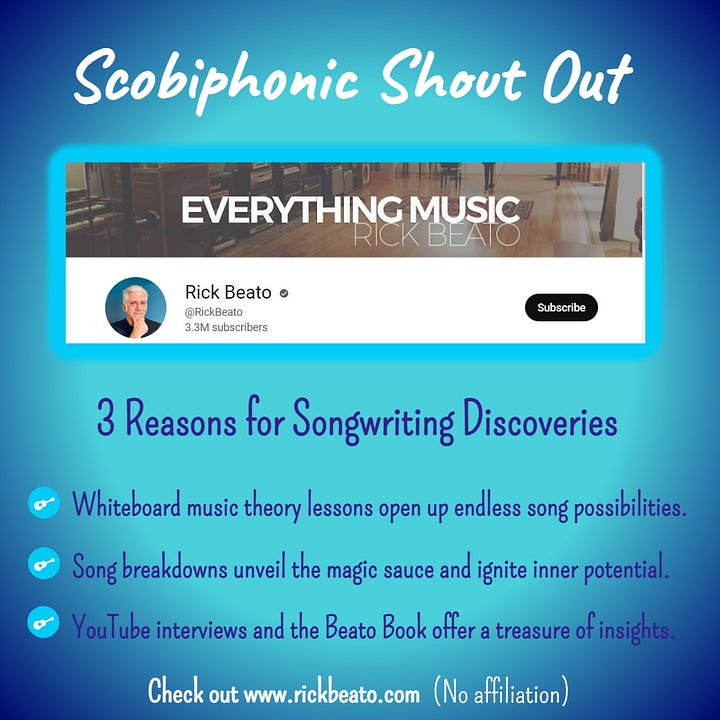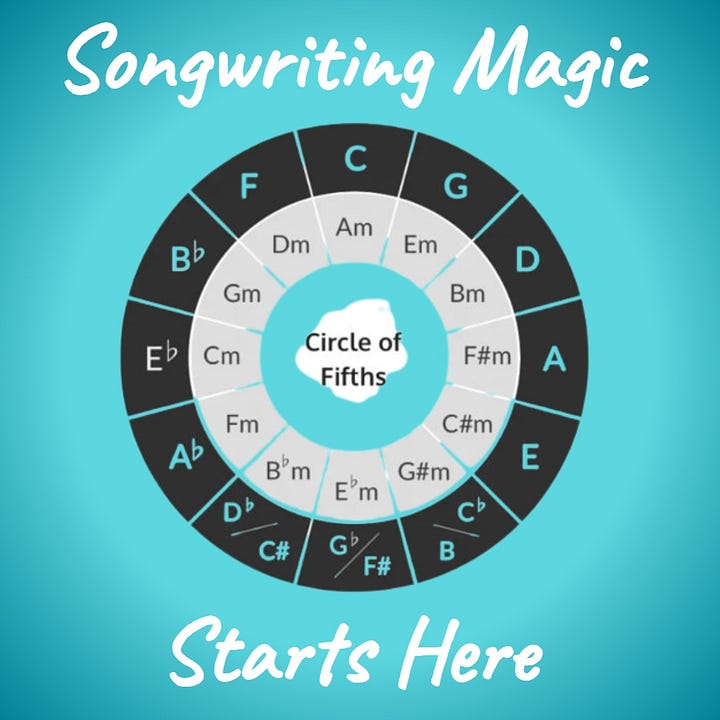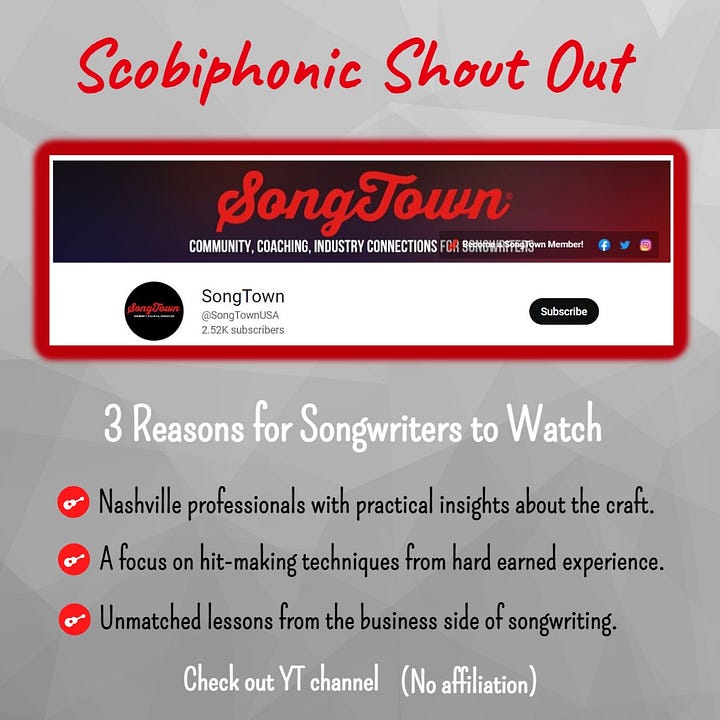YouTube Guitar Gurus: How to Find the Perfect Sage
True mentors are hard to find, my approach to finding precious songwriting tips
YouTube is a massive repository of music information. That’s both good and bad.
It’s a never-ending haystack of rock song tutorials, electric guitar shredding show-offs, famous riff instructors and countless brand reviews and comparisons. It’s a constant search to find the golden needles hidden in the mounds of redundant content creation.
As a Boomer trained on old chord songbooks, my perspective is skewed by two things. First, back in the day, we had to pay for tutorial content. Buying songbooks meant that you only spent money on your favorite artists - The Beatles, Jackson Browne, Neil Young.
Second, I am overwhelmed at the access to excellent online instruction - for free! This bonanza of musical mentors offers unlimited training to push you onward.
Yet, although YouTube is a treasure trove of invaluable guidance, it requires personal discipline to navigate the maze of endless options. Without a plan of attack, the guitar gurus resemble melodious sirens trying to catch your attention and alter the direction of your progress.
The following is my approach for avoiding dejection and the paradox of choice.
Six Insights for Choosing a Sensible Strategy
My journey into songwriting started in earnest at age 63. I failed to fully take advantage of YouTube as a teaching tool early on. I don’t play electric guitar (yet), so I wasn’t interested in learning hot licks and shredding techniques. Plus, I didn’t put in the work to practice major, minor and pentatonic scales.
I screwed up. I noodled around for years and stayed stuck at the same level.
Covid-19 set the stage for my musical renaissance. The lockdowns of 2020 created a perfect storm to shake off my acoustic guitar playing doldrums. And YouTube proved to be my salvation.
Guitar gurus used the pandemic to solicit new subscribers. They offered excellent free content to capture the attention of lockdown audiences. Thus, I decided it was time to dive into the illusive task of understanding music theory.
Absorbing music theory opened up my musical universe. It swept away decades of haphazard guitar playing and gifted me with a purposeful trajectory for the years that remain.
I owe a debt of gratitude to those YouTube guitar gurus that sprung new life back into my guitar education. Songwriting was once a dream, now it’s a devotion.
Here are a few insights into the process of surviving the swamp of YouTube content and finding the right sage for your own discoveries.
Purpose of Task — This is an important decision to make right from the jump. As an older amateur, my history proved the path forward. I don’t really enjoy just learning popular songs; I wanted to write songs. I’m not a performer (yet) either. Your goal is to know your primary destination and find the right avenues to reach it.
Are you a pure rocker, a metal shredder, a pop singer, a jazz stylist, a composer, a folk artist, a blues player, a country lover, a hybrid or other? Just remember to stay out of the music rut by climbing to the next peak.
Personality and Proficiency — These two traits are going to sway your choices. YouTube amplifies personalities and looks. If you like what you see, you stay. If not, you click. Luckily, every type of tutor is available, from hyped-up superchargers to quiet as a mouse personas. But don’t always limit yourself to that first impression.
It’s hard not to like free content. Even so, be choosy. What are you really getting out of any single content creator? Are you ready to absorb the lessons or are you just watching for fun? Does the YouTuber lead you to discovery or just offer bits and pieces of incongruent material?
Chasing the Algorithms — The all-powerful YouTube algorithm works in mysterious ways. First, it watches what you watch and feeds you a steady stream of similar content. The more guitar gurus you select, the more variety swims in the content swamp. Until you decide on your favorites, it’s a hassle to be bombarded by mediocre channels.
Content creators also watch the algorithm to see what topics are popular and to get video ideas. Most of them copy each other and follow the trends. It’s a content trap for those lacking in originality. Search for unique qualities from true teachers that never run out of ways to incentivize and improve your guitar playing literacy.
Law of Guru Gravity — This is a made-up idea that fits my way of thinking. Gravity keeps us on the ground, where work is done, if you’re not so lightweight that you float in the air. Gravitas determines your weightiness as a means to remain grounded.
Like trees, guitar gurus have different densities. Some are more solid and worth more as mentors. The ‘Law of Guru Gravity’ allows you to sort out the floaters from the strong contenders. Thus, the law leans towards finding the most beneficial prospects after a trial run.
Repeat Performances — If you choose easy mentors, then they’re almost disposable after each lesson. Remember, you’re trying to reach another peak, not stay in your comfort zone. A mentor pushes you beyond your normal limits.
Frustration is a sign of progress. It means you’ve chosen a harder option that tests your musical mettle. Good mentors require repeat performances. The first attempt introduces the concept. The second and third retries usually recur later when you’re more up to speed.
On the Sidelines — Many guitar gurus will deliver decent content, but their presentation style or true value to you is limited. Don’t waste your time by picking too many gurus. Follow the famous adage “less is more” and hone your relationships to fully take advantage of just a handful of gurus best suited for you.
All the others are waiting on the algorithm sidelines in case you go in a different direction.
My Favorite Guitar Gurus
The following represents my music education evolution on YouTube.
My guitar guru search started in earnest during Covid-19 lockdowns in 2020 and led to my songwriting sojourn in 2021 to today. In hindsight, it’s a way to highlight my progression and track my real progress.
The order is relevant and shows the key players in my development.
[These infographics are taken from my Instagram account.]


Rick Beato & the Circle of Fifths
Without a doubt, the most important contributor to my progress is Rick Beato, a musician and producer, and his Everything Music channel. I first gravitated to Beato because of his unique breakdowns of classic rock songs. His musical dissection of chords and melodies elevated my appreciation of old songs to another level.
The real breakthrough, however, resulted from Beato’s detailed ‘Whiteboard Lessons.’ These hour-long music theory lectures revealed the logic and intuitiveness of constructing songs. Unexpectedly, music theory lost its troublesome reputation and became simple to apply.
Beato’s explanation of the Circle of Fifths, a tool that organizes the chromatic scale, sunk into my soul and set me free to explore musical treasure on the guitar. It was a Holy Grail moment. For over 40 years, I thought music theory was beyond my capabilities. In truth, it was always obtainable to discover and flourish.


Sean Daniel & Zombie Guitar (Brian Kelly)
These next two mentors are nothing alike. One is a goofball, the other is a stoic straight-shooter. They both earned my attention due to their stellar instruction.
The airplane logo guy is the silly one. Sean Daniel loves to take off on quirky tangents before dialing in on the real goods. His unique ability to think outside the box unearths ready-to-play ‘hacks’ that are based on theory, not flash. He is foremost a performer and his goal is to get you to play better than you thought you could.
Brian Kelly is the brains (not eaten) behind Zombie Guitar. He is a pure teacher with a passion for music theory. Kelly knocks out any notion that theory is hard. His unhurried delivery and extreme patience allow you to absorb it all at a student’s pace. Maybe that’s his zombie persona. It works wonders.


SongWriters Chop Shop & SongTown
Songwriting demands both an esoteric muse and some solid technical advice from practitioners. Inspiration is essential, but perspiration finishes the process.
Luckily, my muse clocks in for work almost daily. But, I still pan for songwriting nuggets when crossing the Internet stream. The muse flirts with creative titles, melodies and storylines. Song construction artists provide the nuts and bolts for the foundation.
Among the hidden gems is SongWriters Chop Shop, a one-man production band. A chop shop refers to cutting up stolen cars for illegal resale. That’s the method used by SWCS to slice up popular songs and find mechanisms or formulas to test out. This is pure grunt work that leads to unexpected insights. No muse needed.
Nashville, Tennessee is famous for country music. Songwriters flock there, not unlike actors to Los Angeles, to write the next Grammy winner for a major star. It’s a slog fest. Two seasoned and successful songwriters set up SongTown to help guide anyone searching for good advice on making hit records.
I have no desire to write country songs. However, SongTown epiphanies are solid gold.


Justin Guitar & Rhett Shull
Not all YouTubers are going to blow you away with super useful content. Some are insightful in other ways. Whether it’s basic information or technical prowess, you can learn a lot from ordinary or alternative guitar guru channels.
It’s always beneficial to keep a fundamental guitarist handy. Justin Guitar excels at giving guidance to beginners, whether to learn classic songs or improve your playing technique. Too much music theory can destroy your attitude like sinking in quicksand. Justin displays a calm approach to any problem related to your fretboard.
Rhett Shull makes a living as a guitar player and gives insights into being a working musician. He knows the drill from electric and acoustic instruments to amps, pedals and sound mechanics. Shull understands who’s watching his videos and serves his audience with practical knowledge.
Coda
Although it’s cluttered with crap, YouTube is still accessible magic. In the last three years, YouTube transformed my later life.
I am a mediocre guitar player. I spent four decades banging out simple chords, never sang and never wrote songs. Today, I relish finding chord voicings along the entire fretboard, struggle with my natural singing voice and am overjoyed with crafting song ideas into lyrics and melodies.
To illustrate the value of finding the right guitar gurus, I bought the following courses for less than $200 to enhance the training found on YouTube. (These are not recommendations, that’s impossible to do, nor affiliate links.)
The Beato Book (Online Version) — The full enchilada of music theory as written by Rick Beato in a pdf document, but now available as an accessible online interactive reference book.
Zombie Guitar (Full Course) — Brian Kelly sold me with his teaching style and his never-ending instruction videos, backing tracks and positive vibes.
Cowboy Chord Breakout (Short Course) — A surprise purchase. Rhett Shull nailed my dilemma to finally open up the fretboard to more dynamic chord voicings.
Being semi-retired now certainly helps the songwriting cause. Both the Covid-19 lockdowns and YouTube channels conspired at the right time to set the stage for my Golden Years.
I’ve only uploaded fourteen original songs, but there are another twenty song ideas in the works. It’s a blast to be creative in my sixties and fulfilling a lifelong dream.
Thanks YouTube!
===================================
If you like the songs and/or essays, please help me distribute them by sharing and following me on Twitter and Substack. I also use Instagram to document the journey and offer songwriting insights.
I appreciate your time, support and aid in this endeavor.
Except in special cases, my original songs are free to the public. Please be mindful that alterations for racist intent is not permitted. Be critical, not hateful.





I love Rick too. On all topics, he is a great presenter of information. And it’s good to find an Australian guru too, in Justin. My all time favourite is James James. I’m sure you’ve seen some his tutorials. And he always wears a T-shirt and plays a guitar that matches the song and artist.